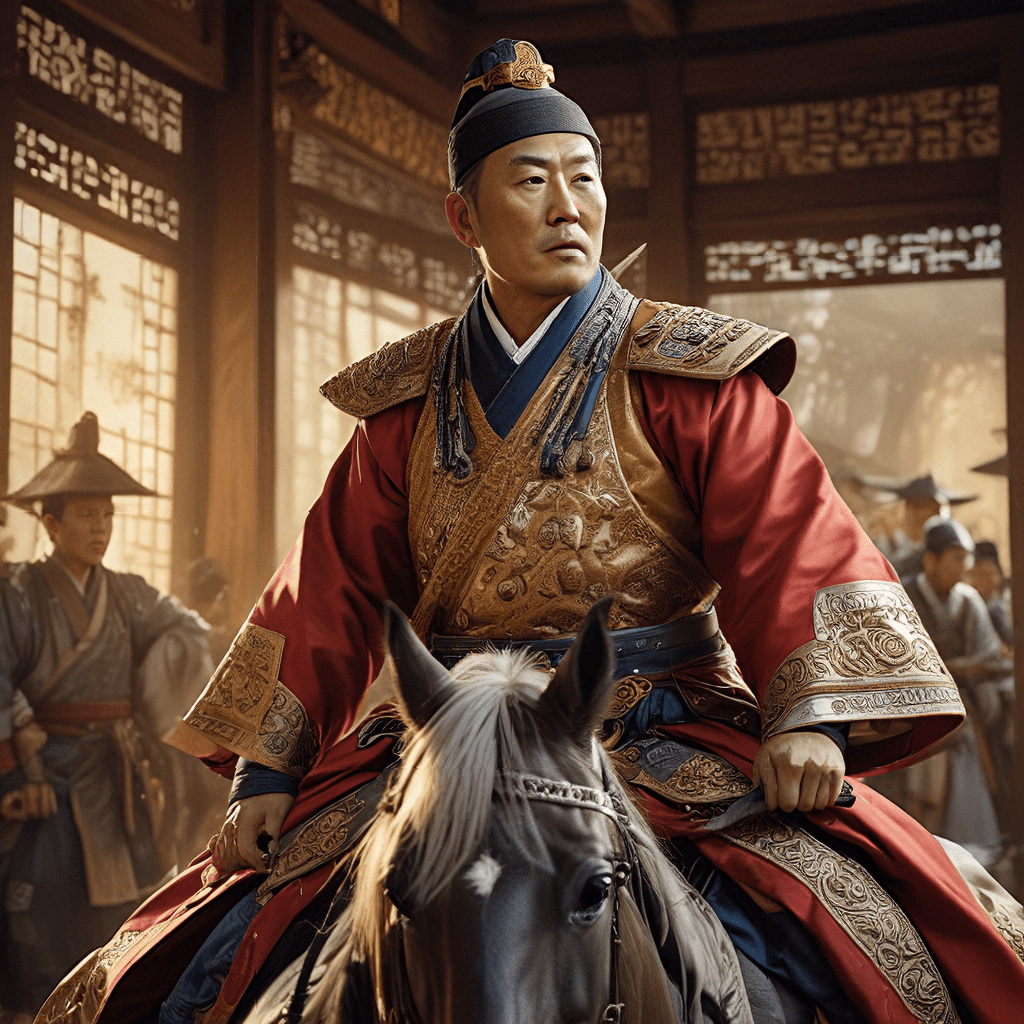The Legend of General Kim Yushin in Korean History
Kim Yushin is a name synonymous with Korean history, a figure etched in legend and enshrined in the annals of the nation's past. His story, spanning a lifetime of military brilliance and political intrigue, is as captivating as it is multifaceted. He was a warrior of unmatched skill, a strategist who helped shape the destiny of a nation, and a political figure who navigated the treacherous currents of power.
I. The Mythological Figure of Kim Yushin
Kim Yushin’s legend, like many historical figures, is woven with mythical threads. He is often described as a warrior blessed with supernatural abilities, a "divine warrior" who embodied courage, leadership, and unwavering loyalty. Even before his birth, his mother is said to have dreamt of a golden dragon, a symbol of power and good fortune, foreshadowing his legendary destiny. As a child, tales abound of his extraordinary strength and intelligence, his exceptional skills in martial arts and strategy foreshadowing his future successes. These mythical elements, while not verifiable through historical records, speak to the enduring power of his legend in Korean culture.
II. Kim Yushin in the Silla Dynasty: A Historical Figure
While the mythical elements of his story add to his mystique, Kim Yushin was, above all, a real historical figure. He lived during the Silla Dynasty, one of the Three Kingdoms of Korea, a period marked by intense rivalry and warfare. Born into a noble family, Kim Yushin received a privileged education, learning the art of warfare and political maneuvering from a young age. His skills would later be honed on the battlefield, where he rose through the ranks to become one of Silla’s most celebrated generals.
III. The Triumph of Silla: Kim Yushin’s Role in Unification
Kim Yushin played a pivotal role in the unification of Korea under the Silla Dynasty. His military genius and strategic brilliance were instrumental in Silla's victory over its rivals, Baekje and Goguryeo. He led armies to victory in numerous battles, strategically planning campaigns that exploited his opponents’ weaknesses and maximized the strengths of his own forces. He was not only a skilled warrior, but also a master of diplomacy, forging alliances and negotiating peace treaties that secured Silla’s dominance.
IV. Key Battles and Strategies: A Look at Kim Yushin’s Military Genius
Kim Yushin's military successes were often marked by his innovative strategies and his ability to adapt to changing circumstances. One of his most famous victories was at the Battle of Hwangsanbeol, where he skillfully outmaneuvered the Baekje army by using a flanking attack to achieve a decisive victory. His strategic brilliance also manifested in his use of deception, such as when he feigned a retreat to lure the enemy into a trap. These tactical maneuvers cemented his reputation as a brilliant military commander.
V. The Legend of the “Four Dragons”: Mythology and Reality
The legend of the "Four Dragons" is intimately intertwined with Kim Yushin's life. These four generals, Kim Yushin, Kim Chun-chu, Kim Mu-moon, and Kim Yu-sin, were said to have been the pillars of Silla’s military strength. While the myth adds a heroic aura to their exploits, it is important to acknowledge that these four generals were historical figures who contributed to Silla's victory. Despite the mythological embellishments, their collective efforts played a crucial role in shaping the course of Korean history.
VI. Kim Yushin’s Legacy: A Figure of National Unity and Courage
Kim Yushin’s legacy transcends his military achievements. He is revered as a symbol of national unity, a figure who embodied the ideals of courage, loyalty, and patriotism. His unwavering commitment to Silla’s cause, his strategic brilliance in unifying the Korean peninsula, and his unwavering dedication to his nation made him a true hero in the eyes of the Korean people. His story continues to inspire generations of Koreans, reminding them of the strength and resilience of their ancestors. He is a source of national pride, a reminder of the triumphs that can be achieved through unity and perseverance.
VII. A Hero or a Tyrant? Examining Kim Yushin’s Moral Complexity
While hailed as a national hero, Kim Yushin’s legacy is not without its complexities. He was a product of his time, a period marked by political intrigue, power struggles, and ruthless competition. Despite his commitment to unifying Korea, his methods were not always morally sound. He was known to be ruthless in pursuing his goals, and his actions sometimes involved deception and even bloodshed. He was a powerful figure who wielded his influence to achieve his objectives, and his political maneuvering often generated resentment among those who opposed him.
The debate over whether Kim Yushin was a true hero or a ruthless tyrant continues to this day. Some argue that his actions, however ruthless, were necessary to achieve greater national unity and stability. Others contend that his relentless pursuit of power and influence came at the expense of moral principles and justice. This complex moral ambiguity adds depth to his story, reminding us that even the most celebrated figures in history are human beings with their own flaws and contradictions.
VIII. The Influence of Confucianism on the Kim Yushin Legend
Confucianism, a philosophy that emphasizes virtue, loyalty, and social harmony, deeply influenced the development of Kim Yushin’s legend. His story, brimming with themes of loyalty, patriotism, and self-sacrifice, resonated with Confucian ideals. These themes, central to Confucian thought, were amplified in the tales and stories that circulated about Kim Yushin. His character, as depicted in historical accounts and folklore, reflected Confucian values, solidifying his image as a virtuous leader and a national hero.
IX. Kim Yushin in Popular Culture: Influence on Literature, Drama, and Film
Kim Yushin’s story has inspired countless works of art and literature, from epic poems and historical novels to dramas and films. His legend has been reinterpreted and reimagined in various mediums, reflecting the enduring power of his story and its relevance to Korean culture. These works often depict him as a larger-than-life figure, a symbol of strength and courage, and a testament to the resilience of the Korean spirit. This enduring legacy speaks to the power of his story to captivate and inspire audiences across generations.
X. The Enduring Legacy of Kim Yushin: The Hero of Korean National Identity
Kim Yushin remains a towering figure in Korean history, a potent symbol of national identity and a source of inspiration for Koreans around the world. His legend, interwoven with myth and history, continues to captivate and inspire, reminding people of the importance of courage, loyalty, and the pursuit of national unity. He is a reminder that even in the midst of conflict and adversity, great achievements can be accomplished through determination, resilience, and a shared sense of purpose. Kim Yushin's story is not merely a historical tale, but a powerful testament to the enduring spirit of the Korean people.
FAQs:
Q: Was Kim Yushin a real historical figure?
A: Yes, Kim Yushin was a real historical figure who lived during the Silla Dynasty. However, his legend has been embellished over time with mythical elements that add to his mystique.
Q: What was Kim Yushin's most significant contribution to Korean history?
A: Kim Yushin is most known for his role in unifying Korea under the Silla Dynasty. His military genius and strategic brilliance helped Silla conquer its rivals, Baekje and Goguryeo.
Q: What is the legend of the "Four Dragons"?
A: The "Four Dragons" were four legendary generals of the Silla Dynasty, including Kim Yushin. The myth claims they were instrumental in Silla's victory and united Korea. While the myth adds a heroic aura to their exploits, these four generals were real historical figures.
Q: Is Kim Yushin considered a hero or a tyrant?
A: Kim Yushin's legacy is complex. He is revered as a national hero for his role in unifying Korea, but some argue his methods were ruthless and often involved deception and bloodshed. His actions remain a subject of debate and interpretation.
Q: How has Kim Yushin's story been portrayed in popular culture?
A: Kim Yushin's story has inspired numerous works of art and literature, including epic poems, historical novels, dramas, and films. These works often depict him as a larger-than-life figure, a symbol of strength and courage, and a testament to the Korean spirit.



